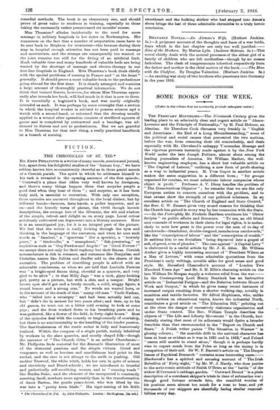FICTION.
THE CHRONICLES OF ST. TID.•
MR. EDEN PEILLYOTTS is a writer of many moods, sombre and jocund, but, apart from his delightful studies of the "human boy," we have seldom known him so consistently cheerful as in these genial annals of a Cornish parish. The spirit in which he addressee himself to his task is revealed in the opening sentence of the first episode:
Cornwall's a place that ictden very well known by foreigners, and there's many things happen there that surprise people a good deal when they hear of them " ; and surprise, as it has been truly said, is essential to recreation. With only one exception, these episodes are narrated throughout in the local dialect, but by different hands—farmers, farm-hands, a police inspector, and so on—and the homely turns of phrase, the vivid though laconit descriptions, the strange lore of the illiterate, the wit and wisdom of the simple, refresh and delight us on every page. Local colour sedulously cultivated can degenerate into a literary nuisance. Here it is an unmitigated joy, for it is an integral part of the picture. We feel that the writer is really looking through the eyes and thinking in the language of the narrators, and when he uses such words as " fansical," a " spectrum " (for a spectre), a " bowerly piece," a " timdoodle," a " mumphead," " fish-jowstering," or expletives such as " Guy Fawkes and Angels ! " or "Good Powers l" we accept them not only for their euphony but their fitness. Cornish nomenclature is rich in romance, and surnames like Nanjulian and Christian names like Julitta and Jenifer add to the charm of the narrative. The problem of describing people is solved with an admirable conciseness, as when we are told that Lucinda Parsons was " a bright-eyed flaxen thing, cheerful as a sparrow, and very glad to be alive " ; er that Milly Jago " was a dark, gipsy-looking girl, pretty as a picture, but with a ohin and a temper. Bright brown eyes she'd got and a lovely mouth, a solid, stuggy figure, a round bosom and a strong arm." No words are wasted here, or in the account of the death of that " sunny old man " Uncle Nathan, who " failed into a catalepsy " and had been actually laid out, but " didn't die in earnest for two years after ; said then, up to his old games, he went out on a bitter cold evening to look at some pigs ; and the frost worked down to his breathing parts and he was gathered, like a flower of the field, in forty-eight hours." Most of the episodes deal with the comedy or tragi-comedy of courtship, but there is no sentimentality in the handling of the tender passion. The inarticulateness of the rustic suitor is fully and humorously realized. Within the compass of a single parish, mainly inhabited by workers in the slate quarries, and mostly chapel folk—though the narrator of " The Church Grim " is an ardent Churchman— Mr. Phillpotta finds material for the dramatic illustration of most of the elemental passions and the simple virtues. Greed and vengeance as well as heroism and unselfishness lend point to the recital, and the race is not always to the swift or pushing. Old mother Trewoof, the white witch, holds her own in spite of science and electricity and Board-schools ; we are introduced to trustful and pathetically self-sacrificing women and to " cunning toads " like Bertha Bake; and the element of tho unexpected is constantly asserting itself, nowhere more agreeably than in the transformation of Amos Barton, the gentle peace-lover, who was lifted by the war into a " pretty keen blade." His tiger-taming of his fickle
• The Chronicles of St. Tid. By Eden Pinlipottn. London : SkeilIngtoaa l V. not.1
sweetheart and the hulking shirker who had stepped into Arnate's shoes brings the last of these admirable chronicles to a truly heroic conclusion.


































 Previous page
Previous page